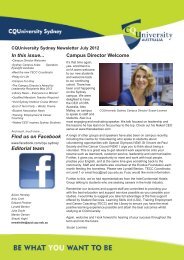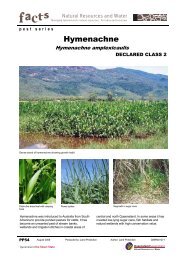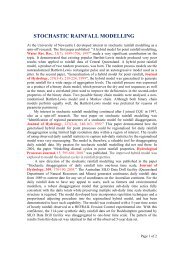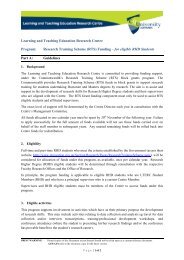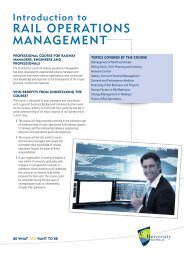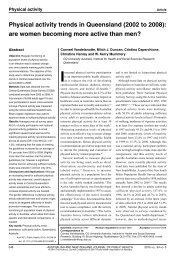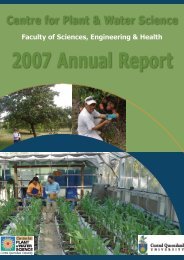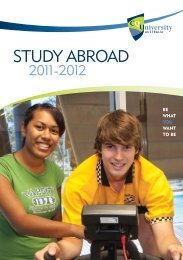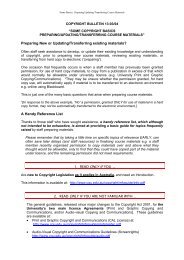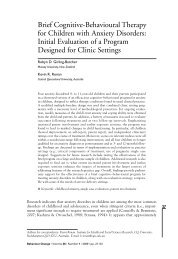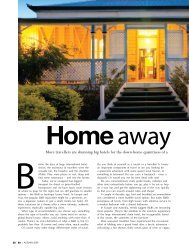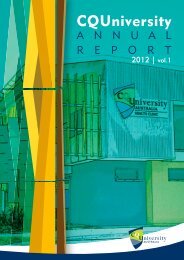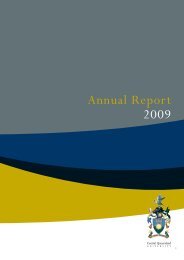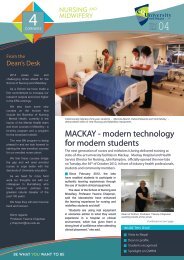View mobile device version - Central Queensland University
View mobile device version - Central Queensland University
View mobile device version - Central Queensland University
Create successful ePaper yourself
Turn your PDF publications into a flip-book with our unique Google optimized e-Paper software.
11<br />
While a giraffe needs only two<br />
hours of sleep each day to<br />
survive, humans are far more<br />
sleep-thirsty requiring four<br />
times as long. And if we don’t<br />
get the right amount of rest<br />
our bodies react in more ways than one. Not only do<br />
we get irritable – hence the saying “getting up on the<br />
wrong side of the bed” – sleeplessness can affect the<br />
body’s natural healing mechanism, immune system,<br />
ability to cope with stress, memory function and<br />
weight control. Yes, that’s right – if you don’t get<br />
enough sleep you can kiss that diet success goodbye.<br />
ACCORDING TO CQUNIVERSITY’S RESIDENT SLEEP EXPERT<br />
AND HEAD OF THE APPLETON INSTITUTE RESEARCH CENTRE<br />
PROFESSOR DREW DAWSON, HEALTHY SLEEP HABITS ARE<br />
DIRECTLY LINKED TO THE WELLBEING IN YOUR WAKING<br />
LIFE. “WE KNOW THAT A POOR SLEEP ROUTINE CAN IMPACT<br />
ON ALL KINDS OF HEALTH FACTORS, CAUSING SIGNIFICANT<br />
DETRIMENT TO YOUR PHYSICAL AND MENTAL WELL BEING. THE<br />
IMPORTANCE OF GETTING GOOD, HEALTHY SLEEP THEREFORE<br />
CANNOT BE UNDERSTATED.<br />
“WHAT WE FIND IS THAT PEOPLE WHO DON’T GET ENOUGH<br />
SLEEP ARE FAR MORE LIKELY TO HAVE A COMPROMISED<br />
IMMUNE SYSTEM THEREFORE GET MORE COLDS AND FLUS.<br />
THEY ARE ALSO MORE LIKELY TO BE LESS PRODUCTIVE IN THE<br />
WORKPLACE AND HAVE MORE TIME OFF WORK.”<br />
National Sleep Census<br />
According to Australia’s largest and most<br />
comprehensive sleep survey conducted by CQ<strong>University</strong><br />
and bed manufacturer Sealy, the vast majority, a<br />
whopping 96 per cent, of Aussies say they wake up<br />
tired from their sleep, leaving only 4 per cent waking<br />
refreshed. Most of us also feel tired throughout the day<br />
due to poor sleep. “Considering how important sleep<br />
is and how much time we spend in bed, these results<br />
indicate that the majority of us are not sleeping that<br />
well,” says Sealy’s sleep expert Ross Gage.<br />
While the majority of respondents to the survey<br />
recognised 8 hours as the recommended amount of<br />
sleep you need to perform at your best, many of us (70<br />
per cent) wake up during the night due to some kind of<br />
disturbance, from noisy neighbours and animals to loud<br />
traffic and even the sound of rain. However our partners<br />
are also to blame, with 35 per cent of those surveyed<br />
saying they are often woken up during the night by<br />
their spouse, from snoring, going to the bathroom or<br />
answering phone calls or emails.<br />
Sleep affects work<br />
Do you work with moody colleagues? It may be that<br />
they are just tired. This latest survey revealed that<br />
most Aussies admitted to their work productivity being<br />
affected due to tiredness and more than a third of us<br />
admitted to falling asleep on the job. We even use lack<br />
of sleep as an excuse to call in sick.<br />
However sleeplessness can have more serious<br />
consequences. Many workplace injuries have a direct<br />
link to fatigue as a result of inadequate restorative<br />
sleep. According to Workplace Health and Safety<br />
<strong>Queensland</strong>’s (WHSQ) Chief Medical Officer Ki Douglas,<br />
fatigue leads to poor judgement, poor performance on<br />
skilled tasks (especially new or unfamiliar tasks), and<br />
slower reaction times. “Fatigue stops you appreciating<br />
how serious a situation has become. It is harder to<br />
undertake complex tasks when fatigued.”<br />
Research clearly shows that the risk of work-related<br />
incidents is increased in people working more than 60<br />
hours a week, or working 12 hours or more in a day.<br />
Compared with an eight hour shift, incident rates<br />
are doubled after 12 hours at work if no other control<br />
measures are put in place. “For any single incident that<br />
WHSQ investigates, it is very difficult to prove that<br />
fatigue was causative as there are not tests that can be<br />
done. However it is generally a process of excluding<br />
other factors.” Douglas says WHSQ’s main message<br />
is that fatigue is a shared responsibility between both<br />
employer and employee.<br />
Tired and getting fat<br />
Scientists have for some time known that being<br />
overweight can cause sleeplessness, but recent studies<br />
have also found a correlation between poor sleep and<br />
obesity. Professor Dawson says while the research is<br />
controversial, it seems as though sleep deprivation may<br />
be a contributing factor to people’s weight gain and<br />
could also cause Type 2 diabetes.<br />
“There could be both physiological and psychological<br />
factors at play here. Firstly, researchers believe<br />
hormones may be playing a part, making our bodies<br />
misinterpret the feeling of tiredness for the need of<br />
food. Secondly, when we’re sleep deprived we simply<br />
can’t get motivated to exercise.”<br />
Sleep hygiene<br />
Like a continuous rollercoaster, people who suffer from<br />
sleeplessness feel like they can never stop to recoup<br />
their sleep loss. The hours awake continue to compound<br />
leaving them continually tired. However, experts<br />
believe that improving one’s sleep hygiene could hold<br />
the key to a good night’s sleep, improving the body’s<br />
restoration processes and providing suffers with some<br />
reprieve.<br />
Sleep hygiene is fundamentally habits that can help<br />
us to sleep or stop us from sleeping. Taking simple<br />
steps like improving bedtime routines, ensuring your<br />
bedroom is comfortable for sleep and learning how to<br />
relax, will increase your chances of getting the right<br />
amount of good sleep.<br />
ACCORDING TO DAWSON, ONE OF THE KEY FACTORS THAT CAN<br />
AFFECT OUR ABILITY TO FALL ASLEEP IS THE USE OF VARIOUS<br />
FORMS OF TECHNOLOGY JUST BEFORE WE CLOSE OUR EYES.<br />
“WATCHING TV, LISTENING TO THE RADIO, USING A COMPUTER<br />
OR TEXTING ON YOUR PHONE IN BED, MAY SEEM LIKE THE<br />
PERFECT WAY TO WIND DOWN, BUT THE RESEARCH SHOWS<br />
THIS COULD BE DOING JUST THE OPPOSITE.”<br />
DID YOU KNOW?<br />
People who exercise fall asleep faster<br />
More than half of Australians sleep with a fitted sheet, top<br />
sheet and doona combination<br />
The most popular activities in bed (aside from sleep and<br />
intimacy) are reading, watching TV, organising or folding<br />
clothing and using the computer<br />
16 per cent of Aussies require some sort of medication to<br />
fall asleep<br />
More than a quarter of Aussies talk in their sleep<br />
4 per cent of Aussies admit to sleep walking<br />
*Results from the Sealy Sleep Census<br />
ISSUE 13



